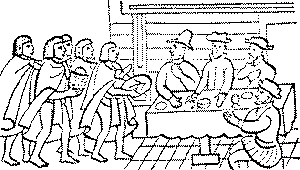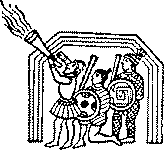
The Comings and Goings of Moctezuma's Messengers
Introduction
Learning from his messengers of the arrival of those strangers who brought with them animals and so many strange things, the spirit of Moctezuma was more and more disturbed. The informants of Sahagún refer how he sent all kinds of magicians and wizards to throw a curse on the Spaniards and to prevent their approach to Mexico-Tenochtitlan. With all his doubts, thinking that possibly they were Gods, Moctezuma also sent captives to be sacrificed in their presence. The informants describe vividly the reaction of the Spaniards when finding this out.
The text also indicates why the conquerors were called "Gods". Before having a clear idea to explain the presence of the strangers, they applied to them the old myth of the return of Quetzalcoatl. They thought that they were the Gods come from the sky, the Gods that returned.
The magicians failed in their attempt to lay a curse on the Spaniards, to make them decide to move away. The messengers told all this to Moctezuma.
In Mexico Tenochtitlan, Moctezuma and the people in general lived intense days of terror. "The Gods", or the strangers, come from beyond the immense sea, threaten to approach the great capital of the Mexicas. The native text gives us something like a psychological story of Moctezuma overwhelmed by doubts and hesitations. At the end we see the great tlahtoani (king) resigned, controlling his heart to wait and see what will happen.
In this time Moctezuma dispatched a mission. He sent all he could, divinators, magicians. He also sent soldiers, braves, officers.
They had to their charge everything that could be necessary to eat: Earth hens, eggs from these, white tortillas. And everything what those (the Spaniards) requested, or whatever satisfied their hearts. To try and make the visitors look upon them kindly.
He sent captives to be sacrificed to them: who knew if they wanted to drink their blood. And thus the envoys did.
But when they (the Spaniards) saw them (the victims) felt much disgust, they spit on the ground, rubbed their eyelashes; they closed their eyes, moved their heads. And the food that was stained of blood, they rejected it with nausea; covered with blood it stank strongly, it caused disgust, as if the blood was rotten.
And the reason for Moctezuma to act like this, was that he believed that they were Gods, by Gods he took them and as Gods he worshipped them. This was how they were called, "Gods come from the sky". And regarding the black ones, they were called "dirty divinities".
Until later they ate white tortillas, eggs, the hens, and all kinds of fruits, like:
Zapote (several sorts of black, sweet fruit)
Tezonzapote (mamey)
Aztazapote (white zapote)
Caca Zapote (perhaps chicozapote)
Sweet potatos, cuauhcamote, poxcauhcamote (spotted, purple sweet potato), xochicamote (purple sweet potato), tlapalcamote (red sweet potato)
Jícama (a sweet, juicy root), mazaxocotl ("fruit of the deer"), atoyajacote (fruit of the river), xalxocotl (guava)
Cuauhjilotes, avocados, huajes (a kind of pumpkin), tejocotes and capulines (small, wild fruits), tunas (cactus fruits), red tunas, tunas of candy, zapote tunas, water tunas.
Also food for the "deer" (horses); tender tule leafs, cuts of grass and hay.
And even (it is said) he sent them to see what kind of people they were: to see if they could cast some spell on them, to try some curse on them. It could be that they caused them cramps, or some sores, or something along these lines to be produced on them.
Or also it could be that with some word of charm they long spoke to them, and maybe they sickened them, or they died, or perhaps they made them return to where they had come.
They made their workings, their commission towards the Spaniards, but absolutely nothing they could achieve, nothing could they do.
Consequently, when they returned, they reported to Moctezuma what kind of people they were, and how strong:
"We are not their equal contenders, we are as nothing!"
Therefore, Moctezuma issued rigorous orders: scolded with anger, sharply commanded, under death threat imposed rules to the butlers and all the main ones, captains, to look after and carefully take care of anything those could need.
And when they left their ships (the Spaniards) and finally are going to start the march here, and they are moving, they are on their way, they were very careful, honors were paid to them. They came under their protection, and much they made in their favor.

The anguish of Moctezuma and the people in general
Moctezuma pondered those things, was worried; full of fear, of terror. He pondered what was going to happen to the city. And everybody was very afraid. There was great fright and there was terror. Things were discussed, all spoke about the recent happenings.
Meetings are held, there are discussions, people cry, there is much weeping, they cry for the others. They go with bowed heads, walk crestfallen. Weeping they greet each other. They attempt to cheer people, they cheer each other. They caress each other, the children are caressed.
The fathers say:
"Ay, my children! What will happen to you? Oh, to you will happen what is going to happen!"
And the mothers say:
"My children! How will you be able to see what is going to come on you?"
Also they told him, they put before his eyes, let Moctezuma know, communicated to him and had him hear, so that in his heart it was clear:
"A woman from among us, accompanies them, comes speaking for them in nahuatl. Her name, Malintzin; her house, Teticpac. Back in the coast they took her."
At the time also they (the Spaniards), made insistent questions concerning Moctezuma: how he was, perhaps a boy, perhaps a man, perhaps an old one? If still he had vigor, or if already he had lost his sense, if he was an older person, already an old man, if he had a white head.
And they responded to the " Gods ", to the Spaniards:
"He is a mature man; not heavy, but thin, a little lean, of fine body."
Then when Moctezuma heard that much was investigated on him, that his person was being scrutinized, that the "Gods" wished much to see his face, his heart tightened, filled of great anguish. He was almost fleeing, had desires to flee; he yearned to hide fleeing, was almost fleeing. He tried to hide, longed to hide. He wanted to hide from them, he wanted to sneak from the "Gods".
And he thought and he had the thought; he projected and he had the project; he planned and he had the plan; he meditated and he walked meditating about going away into some cave.
And to some of those to whom his heart was open, to those to whom his heart was firm, to those in which he had great confidence, he let them know of it. They said to him:
"We know the place of the dead, the House of the Sun, and the Land of Tlaloc, and the House of Cintli. There it will be necessary to go. Wherever your good will wants."
He had his desire: he wished to go to the House of Cintli (temple of the goddess of maize).
Thus it was possible to be known, therefore the people knew.
But this he could not do. He could not be hidden, could not hide. No longer it was valid, nothing could be done.
The word of the charmers that had upset his heart, that had made it withdraw, they had left it turning, had left it downcast and sad, they had him totally uncertain and insecure, not knowing if he could be hidden where it has been mentioned.
He did nothing more than to wait for them. He did nothing more than to decide it in his heart, he did nothing more than to resign himself; he dominated his heart finally, he set it waiting to see and admire what would come to happen.
Back to the home page.
Any questions, comments or suggestions, please send to Email: acoyauh@hotmail.com
This page hosted by ![]()
Get your own Free Home Page